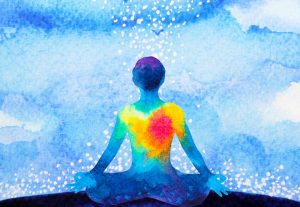
When your grief is fresh and raw, you need compassion. You are your most important source. To be with your grief without being constantly overwhelmed by it requires tremendous self-compassion. When someone you love dies, you are forever changed. At first, the changes you experience can be stressful. You might not sleep, you might sleep all day, you might not eat, you might eat comfort food, you might want to lose yourself in movies or shows, or you might wander around your home feeling fitful and lost, unable to concentrate for more than a moment. You might crave solitude; you might be afraid to be alone. I always remember my aunt saying to me: “Remember, you are not in your right mind.” As annoyed as I was by her comment, I also knew that she was correct. And there was very little to do about my state other than to continue to be compassionate toward myself. Each day I was doing my best. Somedays that meant I was fully functional, and other days it was all I could do to get out of bed and wash my face.
Self-compassion is not an excuse to indulge in harmful or unhealthy habits. It is not a reason to ignore your responsibilities and stop participating in life. It is about you learning the best way to take care of yourself as you move forward. It is about learning to love and cherish yourself, just as your loved one would have wanted you to do.
Being self-compassionate does not mean you never do anything strenuous. The day comes when you need to go back to work, interact with the public, or attend social functions. Self-compassion allows you to be aware of your limitations. To find a way to move forward with your life gently.
As I moved forward on my journey with grief, I realized that I was harboring some resentment toward a couple of people who I felt did not step up to the plate to assist me. I had to sit with this. You might have a situation like this of your own. Death does not always bring out the best in us. You might have friends or relatives who were insensitive during your time of need. And sometimes there is that person who acts up.
Eventually, you realize that these people are just who they are. They have such a fear of death and such discomfort with other people’s suffering that they were not fully there for you. Or because they acted out, you wished they had not shown up at all. Begin to work on sending them compassion during your meditations to release your disappointment in their behavior. Just remember, this is not easy for any of us.
A possible next stop on your journey is to help others whose grief is newer and rawer than yours. If you find that someone else’s difficult situation brings you challenges, this is an opportunity for growth and learning—to get yourself the support you need. You can start with returning to wishing self-compassion for yourself, and when the time comes that you are no longer triggered by death and grief, turn your compassion toward others.
Working with others who are grieving has taught me an important lesson. Not only is this difficult for all of us, but there are also different degrees of difficulty and suffering. Others have experiences that are entirely different from yours. I will admit, there has been a time or two when I realized that I was being judgmental about how someone was navigating their grief. This part of me just knew how they should act, what they needed to hear, and more. Or I would look at someone and think, “Yes, it is awful that your dog died, but you should be able to get up and leave your house and go to work.” But one day, it hit me—I was beginning to act in a way that I found objectionable when grieving. It annoyed me when people would come to me and tell me what I should be doing or how I should be acting. How embarrassing, but at the same time, what a fantastic lesson in compassion and understanding the suffering of others.
It does not matter if I think you should be able to get up and go to work the day after your dog has died. It does not matter if I think you should pull it together and go to the grocery store by yourself. What matters is that you are suffering, and it is not my role to judge what is good suffering. To be helpful, I need to understand that you are suffering—and to be compassionate is to see your suffering—and wish to alleviate your suffering and act when I can. Sometimes, the most humane thing I can do is to send you metta. With this realization came another component to my death training plan—a reminder that just because I have walked through an experience does not mean I am an expert or stronger or doing a better job. We are not all running the same race, so let’s support one another’s experiences.
When you can channel the energy of your grief into doing good deeds for others or sending your compassionate thoughts to others, you are creating positive energy and the deceased may benefit from that energy. In this way, you can acknowledge that they are gone, and without attachment, keep them in your heart and do good things in their name. Again, if the conditions are right, the merit you generate on their behalf may find them.
As you grieve, let there be compassion, first for yourself. Later, send compassion to others who were impacted by your loss. And then, when you feel your strength return, remember that everyone will have this experience, and let this realization fill your heart with an abundance of compassion so that it cannot be contained. Your best response is to send that compassion out to all beings.
If, with a mind free from hate,
one arouses love toward just one being,
one thereby becomes good.
Compassionate in mind toward all beings,
the noble one generates abundant merit. (AN 8.1)
See more
Margaret Meloni: Death Dhamma
The Death Dhamma Podcast (Margaret Meloni)
Related features from Buddhistdoor Global
Anchored in Strength and Compassion: Stories that Transform
Sacred Offerings of Compassion and Relief: Ven. Bhikkhu Sanghasena, the Silent Reformer
The Bodhisattva Healthcare Practitioner
Midwifing Death with Love – Applied Buddhism for Animal Care
Compassion at the Edge














